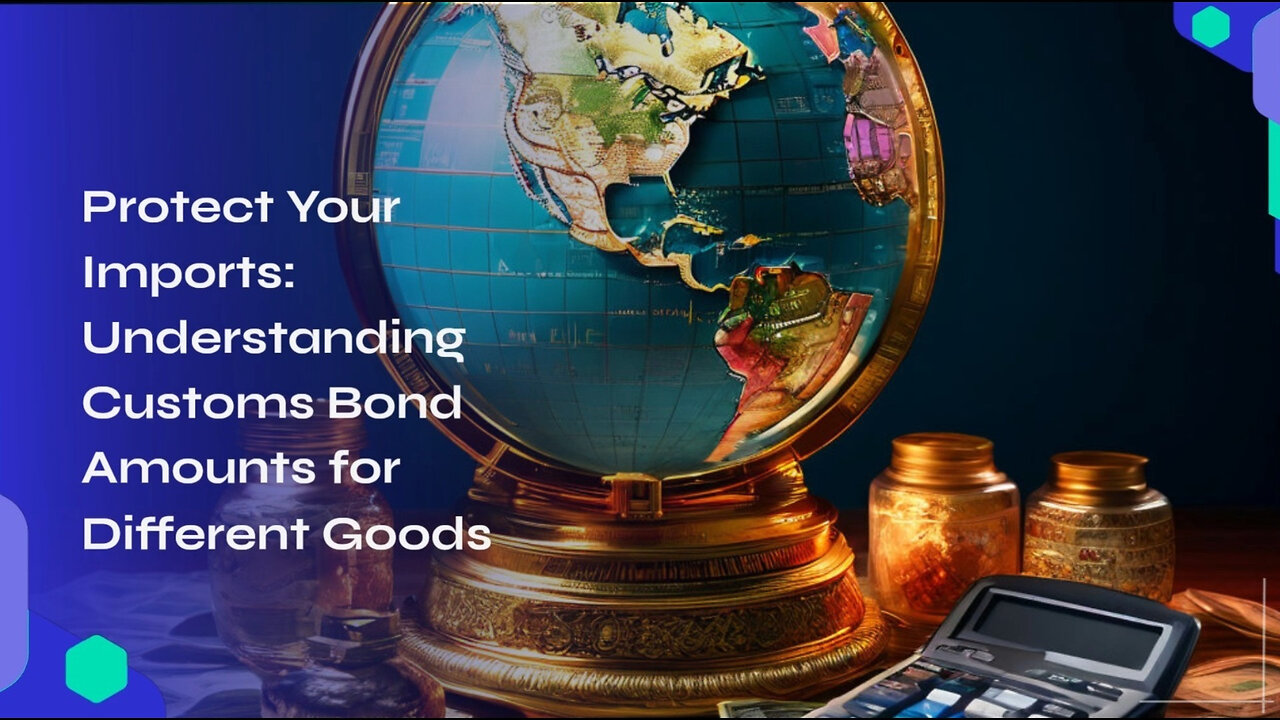Premium Only Content

Protect Your Imports: Understanding Customs Bond Amounts for Different Goods
US Import Bond
Phone: 310-928-1180
Email: info@usimportbond.com
https://usimportbond.com
In today's video, we discussed how the bond amount varies for different types of goods or commodities in the context of customs brokerage. A customs bond serves as a financial guarantee for importers to ensure compliance with customs regulations and payment of duties, taxes, and fines. The bond amount is determined by several factors.
Firstly, the nature of the goods being imported plays a significant role. Certain goods, such as hazardous materials or controlled substances, require a higher bond amount due to the potential risks associated with them. This includes goods like chemicals, firearms, pharmaceuticals, and alcohol. The higher bond amount for these goods covers any potential damages, fines, or penalties that may arise from non-compliance with regulations or accidents during transportation or storage.
Secondly, the value of the goods being imported influences the bond amount. Generally, higher-valued goods require a higher bond amount as customs duties and taxes are based on the value of the goods. Thus, the bond needs to account for these potential financial obligations.
Additionally, the volume of imports and the frequency of shipments are considerations in determining the bond amount. Importers who bring in a large volume of goods or have frequent shipments are likely to require a higher bond amount. This is because they have a greater potential for non-compliance with customs regulations, and the bond needs to cover any outstanding duties, taxes, or penalties.
The importer's compliance history is another crucial factor. If an importer has a history of non-compliance or has been subject to penalties in the past, they may be required to obtain a higher bond amount to mitigate the risk of future violations. Customs authorities take into consideration the importer's track record when assessing the bond amount needed.
Lastly, the type of bond chosen by the importer affects the bond amount. Different types of customs bonds are available, including single entry bonds, continuous bonds, and drawback bonds. The bond amount will vary based on the type selected. Continuous bonds, which cover multiple shipments within a specified period, usually have a higher bond amount than single entry bonds, which only cover a single shipment.
To ensure the appropriate bond amount is determined, it is crucial for importers to work closely with customs brokers. These professionals have expertise in customs regulations and can help assess the specific factors relevant to their clients' situation to determine the appropriate bond amount.
With that, we conclude today's video. We hope you found the information valuable and encourage you to like this video and subscribe to our channel for more informative content. Stay tuned for our upcoming videos, where we'll be covering more topics related to customs brokerage and international trade. Thank you for watching, take care, and continue exploring the world of imports.
#usimportbond #isfcustomsbroker #uscustomsclearing #isfentry
Video Disclaimer Here: No US government affiliations.
00:36 - Customs bonds are essential for importers to ensure compliance with regulations and protect all parties involved in the import process.
01:04 - The bond amount for different goods varies based on factors such as the nature of the goods, their value, volume, frequency of imports, importer's compliance history, and type of bond chosen.
01:18 - Goods like hazardous materials or controlled substances require a higher bond amount due to potential risks associated with them.
02:53 - Importers should work closely with customs brokers to determine the appropriate bond amount for their specific situation.
-
 7:03:49
7:03:49
Dr Disrespect
9 hours ago🔴LIVE - DR DISRESPECT - NEW PC VS. DELTA FORCE - MAX SETTINGS
106K25 -
 49:04
49:04
Lights, Camera, Barstool
1 day agoIs The Monkey The Worst Movie Of The Year?? + Amazon Gets Bond
18.7K2 -
 24:19
24:19
Adam Carolla
21 hours agoDiddy’s Legal Drama Escalates, Smuggler Caught Hiding WHAT? + Philly Eagles & The White House #news
31.6K5 -
 10:12
10:12
Mike Rowe
2 days agoClint Hill: What A Man. What A Life. | The Way I Heard It with Mike Rowe
25.4K5 -
 1:31:52
1:31:52
Redacted News
4 hours agoBOMBSHELL! This is war! FBI whistleblowers reveal Epstein files being destroyed? | Redacted News
112K302 -
 48:55
48:55
Candace Show Podcast
5 hours agoSTOP EVERYTHING. They FINALLY Mentioned ME In The Blake Lively Lawsuit! | Candace Ep 152
93.4K105 -
 1:02:51
1:02:51
In The Litter Box w/ Jewels & Catturd
1 day agoWhere are the Epstein Files? | In the Litter Box w/ Jewels & Catturd – Ep. 750 – 2/26/2025
75.1K80 -
 1:59:06
1:59:06
Revenge of the Cis
6 hours agoLocals Episode 198: Suits
67.3K10 -
 1:38:56
1:38:56
SLS - Street League Skateboarding
1 day agoTop Moments from the Second Half of the 2024 SLS Championship Tour! All The 9’s 🔥
45.8K1 -
 24:22
24:22
Breaking Points
8 hours agoHouse GOP RAMS THROUGH Medicaid Cuts
51.3K34